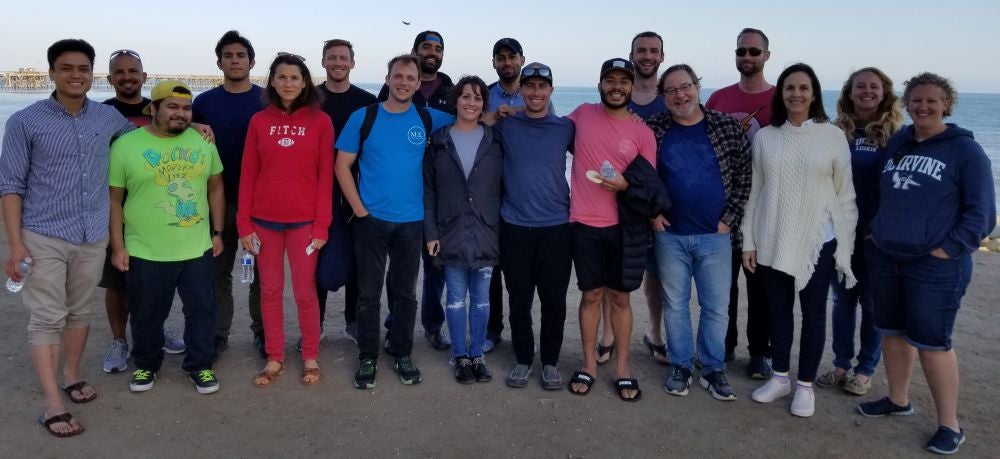
Writers of All Stripes
Patrick Sippel knew he wanted to be a Navy pilot when he was little kid. Taylor Dinehart had no idea what anybody did in the military until she went to college. Gio Cabarello immigrated to the U.S. from the Philippines when he was 14. Anna Matsokina came from Russia. Daniel Oropeza and his family arrived from Venezuela.
A diverse group? Sure, but they all share two things: military service and a University of California education. And they were among 16 current students from across the UC system to participate in the 2018 UC Student Veterans Writing Workshop held recently at UC Santa Barbara.
The five-day workshop aims to give participants the chance to connect with other veterans and tell their stories — and every vet has stories to tell. Some are traumatic, some humorous, and some aren’t repeatable in polite company. What they all have in common, though, is that they’re seen through camouflage-colored glasses, and nobody knows this better than a fellow vet.
And so they came to UCSB to write. Sippel, a Naval Academy graduate who flies the MH-60R Sea Hawk helicopter, just received his MBA from UC San Diego. The lieutenant plans to leave the Navy next year, largely because of the effect his service has on his wife and three children.
“All of us have some burden from our service,” he said. “It may be related to the service directly; certainly that’s the case here. My story today was my homecoming after my 10-month deployment and the effect it had on my 2-year-old at the time. She really didn’t know who I was. And that was really tough, right? That was kind of a defining moment for me.”
For Amanda Eggloff, a former rescue swimmer who became a commissioned Navy nurse, the workshop was a welcome TAD (temporary additional duty) tour of military life. Now a Ph.D. candidate in nursing at UC San Francisco, she medically retired last year after breaking her neck.
“This brotherhood and camaraderie, it kind of feels like we’re all TAD,” she said. “There are four women in this, and we were all talking about going to the store to get, I don’t know, hair gel, and we’re all looking at our phones. What’s the nearest place to walk to? And then Taylor [Dinehart], she says, ‘Guys, we all have cars. We’re not TAD.’ It was so funny. We all have varying times of when we got out, but that’s where we all went, because we all accepted that.”
The writing, though, was more difficult than she expected. She had been an elite athlete, and suddenly she was incapacitated and unable to serve after 16 years. That’s a lot to process.
“I’m writing about stuff that’s really, really, really personal,” Egloff said. “I’m single, a woman and have all these experiences. And it’s like, ‘Man, I made a lot of really selfish life choices.’ I’m trying to share it, because I believe in transparency, because that’s the only true growth: being honest.”
For others, the workshop prompted serious self-reflection. Oropeza, a UC Davis environmental science undergrad, was a Navy logistics specialist. He came to the U.S. from Venezuela when he was 12. His family was close and, he said, that bond and his eagerness to please his parents became his identity. Initially, that’s what he wrote about.
But then the other vets challenged him to write about himself. It wasn’t easy, he said, but he began to realize he’d been living to please his family, not himself.
“So this last story I wrote really delved into that,” Oropeza said, “and I really got to know a part of myself that I probably never would have, to open those thoughts and open that box and see what it’s like and get to know myself better.”
For Susan Derwin, director of the workshop and of UCSB’s Interdisciplinary Humanities Center, it’s gratifying to watch the vets grow as writers and people. “The progress you see; it’s so rapid, it’s amazing,” she said. “I go from despair on the second day to elation on the third day. They’re really doing the work.”
Dinehart, an urban planning graduate student at UCLA, has been doing the work since she joined the Reserve Officer Training Corps as an undergraduate at Florida State University. She would go on to become the first person, possibly, to fly Apache helicopters in the Army because she wanted to be a writer.
“When I looked up the biographies of all of the authors that I loved, they were people who did things,” Dinehart said. “They were scientists and they were veterans and they were war correspondents — people who just lived life, and then wrote about the things that they experienced. So I was like, I need to just live life, and what job out there can I live that’s a sexy, cool, weird, aggressive, violent life where maybe I’ll get my arms blown off and die in a blaze of glory. I could get a story out of it. And I didn’t know anything about the military at all, but I imagined it was a lot of crawling in the mud, climbing trees and shooting people and getting shot at. So I thought that’s where I could get the experience I was lacking.”
Mission accomplished. After 11 years and three deployments to the Middle East, she has stories to tell. Sometimes it’s complicated.
“I’ve gotten emotional, which is surprising, because I didn’t think that I would,” Dinehart said. “I wrote something yesterday and it didn’t seem like — I wrote it without feeling anything — but when I actually read it in front of people, I got choked up and was crying. I was like, ‘Oh my god, why? What is happening?’ But some kinds of emotion are there, so it’s cool that I felt comfortable enough to let it out.”



